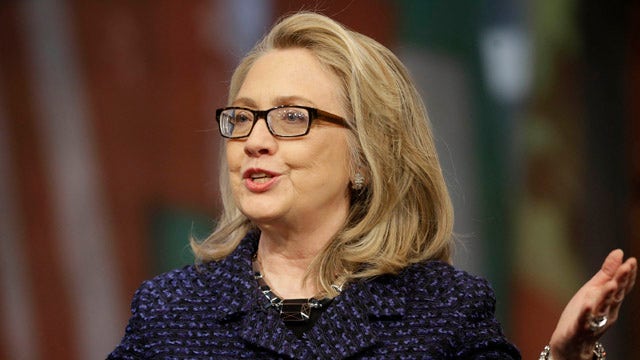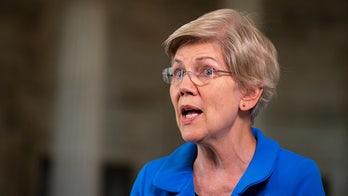Power Play 5/7/2013
Sanford and Colbert: Down to the wire. Benghazi: Now a scandal, but what kind? Plus - Debt ceiling fight takes shape.
“I still remember Colonel Gibson, he said, ‘I have never been so embarrassed in my life that a State Department officer has bigger balls than somebody in the military.’ A nice compliment.”
-- Greg Hicks, formerly the second-ranking U.S. diplomat in Libya, talking to congressional investigators about receiving word from a commander on the ground that Defense officials had refused a request to send troops to aid Americans besieged by Islamist militants.
The biggest news this week about the 2016 presidential election is not New Jersey Gov. Chris Christie’s weight-loss surgery.
Nor is it those on the right rallying against immigration legislation backed by Sen. Marco Rubio, R-Fla.
The big story is Benghazi, because it involves the frontrunner, former Secretary of State Hillary Clinton. And the implications are serious.
[pullquote]
Washington is on the edge of its seat as the House Oversight committee gets ready to hear testimony from whistleblowers who say that the Obama administration botched the response to the Sept. 11, 2012 attack on the U.S. consulate and then covered up the nature of the raid.
While Democrats express outrage that Republicans are “politicizing” the tragic events that led to the first killing of a U.S. ambassador since the Carter administration, everyone now agrees that not only was the situation mishandled but that the Obama administration didn’t come clean.
In the best telling of events for Clinton, she sidestepped the incident, allowing Obama intimates to take the fall. In the worst telling, Clinton was part of decisions that left Americans vulnerable, denied them assistance under fire and then elided when the time came to go public about the attack.
Neither is particularly helpful to a woman whose 2016 supporters see her service as secretary of State as the key to presenting Clinton as the next commander in chief. Clinton angrily defended her record when called to testify in January about the incident, famously shouting “What difference does it make?” about the false talking points offered by the administration in the wake of the attack.
But righteous indignation can only work once. And if a politician can’t make it stick, it can actually make things worse.
FOX News colleague James Rosen reports that another whistleblower will testify on Wednesday that Clinton tried to cut the agency’s counterterrorism bureau out of the process during the attack. Clinton’s team denies the claim, but even in so doing, reaffirms her central role in the response and talking points about the attacks. No bystander was she.
Clinton has centered her defense on an internal review of her agency’s conduct before, during and after the raid. The review lamented security preparations at the consulate, but that is another way of saying that if Republicans had been freer with funding for the State Department, better precautions would have been taken.
But that review itself is falling into disrepute as credible whistleblowers step forward and provide new details, the most damning of which is the claim that officials squelched an effort to send a handful of Special Operations troops to aid the doomed Americans.
It’s not unreasonable for President Obama, Clinton and others to have decided that the loss of four Americans to an attack by Islamist militants was preferable to expanding the fight and risking a larger, bloodier and more potentially embarrassing battle in Libyan rebel capital. It is not reasonable, though, to mislead the public about such a decision.
Asking that Americans die in the line of duty in service of a larger policy aim is nothing new. Saying that there was no choice when there were at least some options, crosses a line. Changing talking points to support a false account of events would cross yet another. Doing so eight weeks before an election would be really rotten.
Some Republicans remain focused on bringing the botch and alleged cover up to Obama’s feet. And like other second-term scandals, this one could further clip the wings of a lame duck in the White House. A charge of passivity in the face of an attack is especially difficult at a moment when the U.S. seems to be a bystander to a rapidly devolving security situation in the Middle East.
(Not intervening in Syria may be a perfectly reasonable choice, especially given some of the scrofulous characters in the rebel forces. But it is a choice, the Israelis having now shown that strategic strikes are possible inside Syria.)
But Republicans playing the long game know that the real issue here isn’t the current Democrat in the White House but derailing the chances of the woman who wants to be the next one.
As Clinton learned before, being an early, prohibitive frontrunner isn’t without its dangers. And three years is a long time to stay in the dunking booth.
And Now, A Word From Charles
“[Greg] Hicks was the acting ambassador, of course, at the time after the death of Ambassador [Chris] Stevens. He said as a result of embarrassing, humiliating, the [Libyan] government, that is probably why there was no cooperation afterwards in the FBI investigation.”
-- Charles Krauthammer on “Special Report with Bret Baier.”
Chris Stirewalt is digital politics editor for Fox News, and his POWER PLAY column appears Monday-Friday on FoxNews.com. Catch Chris Live online daily at 11:30amET at http:live.foxnews.com.





